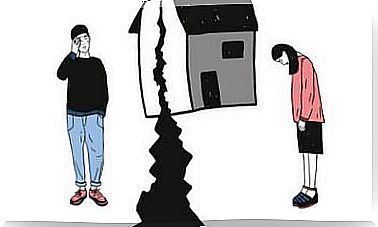Why Is It So Hard To Stop Procrastinating?

“I should get to work. Tomorrow I have to deliver that report and I haven’t even turned on the computer yet” . “I have two days to solve a problem I’ve been dragging around for weeks, but I still can’t get started.” Why can’t you stop procrastinating? Are you destined to be lazy? Why is your mind unable to focus on real priorities?
It’s all too common to tell ourselves that we’re being irresponsible and lazy when we’re in a cycle of procrastination and constant guilt. However, doing this only makes things worse. In fact, few things intensify the act of procrastinating as much as negative and disqualifying self-talk.
After all, people who are really lazy, idle and carefree don’t mind being like that. They are only concerned with making excuses for not doing what they should. In contrast, when you procrastinate, you end up feeling bad.
Therefore, it is essential to understand what is behind this behavior in order not to let it affect your life.

Why can’t you stop procrastinating?
We tend to associate procrastination with young students. However, people of any age can procrastinate. We feel this, for example, when we have to renovate the kitchen or garage. Also when it comes to work, such as filling out documents or completing detailed projects. Even though we know it’s something we have to do, we can’t seem to get to work.
So when you feel like you can’t stop procrastinating, what you experience is stagnation and lack of progress, and that feeling makes you anxious. When you go through this, two things happen.
- The first is that procrastination has consequences. You could lose a job, fail an exam, or miss an opportunity.
- The second is that you may start to think badly of yourself. You feel ineffective, and what’s worse, you feel like it’s something you can’t control. It doesn’t matter if you decide to start working, in the end, something will always happen to distract you from the task.
What is this kind of behavior due to?
It’s not a time management issue: it’s your emotions
When you ask yourself “Why can’t I stop procrastinating?” , it is common to think that the problem is poor time management. So many people buy books that can teach them how to manage their time better. However, in most cases, the procrastination remains the same.
Telling a person who has been procrastinating for months to be more organized is like telling a depressed person to cheer up. It doesn’t make sense because, in reality, the basic problem is in the person’s emotions: their anxiety, their worries, their fears, their need to do things well, their fear of making mistakes…
The emotions that combine, bother and increase the discomfort of people used to procrastinating are very complex and exhausting. Worst of all, these situations drag on for months, and in these cases, the person may be experiencing depression or an undiagnosed anxiety disorder.
Why can’t I stop procrastinating? The fear behind procrastination
It may seem contradictory, but there is fear behind the question “Why can’t I stop procrastinating?” . But afraid of what?
A study carried out at the University of Leuphana, Germany, demonstrated that procrastination is basically a dysfunctional response to unwanted affective states. I mean, there are probably a lot of things you need to do that make you fearful and uneasy. Because you don’t know how to handle these emotional states, you decide to avoid them. That’s where procrastination kicks in.
In general, what is behind procrastination is fear:
- Fear of failing and not meeting other people’s expectations or your own.
- Anxiety of facing certain situations that leave you exposed and over which you have no control.
- It’s also often an aversion to having to do something you just don’t want to do or don’t like.

If you have a goal, focus on your emotions before the goal itself
Think about these scenarios. Setting a goal for yourself, having to accomplish a task or delivering something by a specific deadline. When it comes to events like these, people often make a small mistake. They focus on the deadline and then plan. That’s not exactly bad. However, the planning should be secondary, the main focus should be the emotions.
If a task makes you anxious, you don’t move on. It is necessary to work on your emotional state first and then think about your goal. If you’re not excited, you won’t have the strength and motivation to invest time in it. You must manage these feelings, reframe your thoughts, reduce your fears, and be able to stay in a relaxed, focused frame of mind to be productive.
In addition, Dr. Sirois and Pychyl (2013), from the University of Leeds, UK, invite us to take into account the following: before dedicating ourselves to a long-term goal, we must urgently propose a goal of short term: taking care of our state of mind.
In short, if you’re feeling good mentally, you can do anything you want. Emotional management will always be the best wellness strategy. Keep this in mind at all times!









